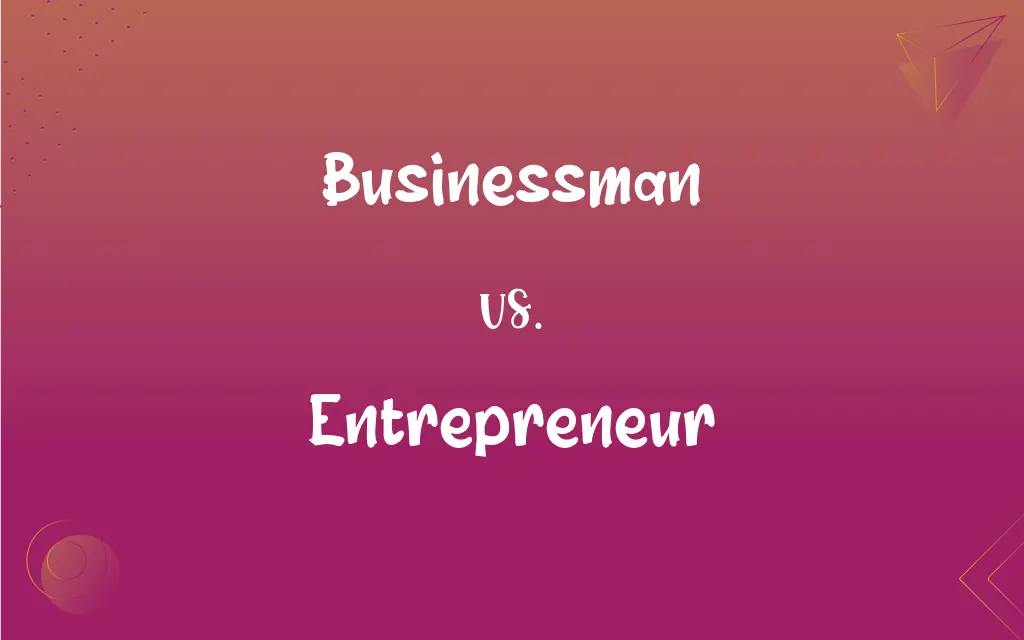Businessman vs. Entrepreneur: What's the Difference?
Edited by Aimie Carlson || By Harlon Moss || Updated on October 21, 2023
A businessman operates an established venture, focusing on profitability and stability; an entrepreneur innovates, takes risks, and creates new ventures.

Key Differences
Both businessman and entrepreneur play pivotal roles in the economic world, but their approaches can differ significantly. While a businessman typically maintains and grows an established venture, ensuring steady profits, an entrepreneur is more inclined to innovate, initiating a new business or venture from scratch.
Risk tolerance and innovation often set businessmen and entrepreneurs apart. A businessman generally seeks stable operations, minimizing risks. An entrepreneur, on the other hand, is recognized for taking calculated risks, often pushing boundaries to bring novel ideas or products to market.
Financial objectives for businessmen and entrepreneurs can differ. A businessman is typically motivated by consistent profitability and business growth, ensuring returns on investments. An entrepreneur might be more focused on obtaining initial funding, scaling rapidly, and potentially achieving a lucrative exit, such as a buyout or IPO.
The mindset of a businessman and entrepreneur can be contrasting. Businessmen often prioritize operational efficiency, customer retention, and market presence. Entrepreneurs lean toward innovation, disruption, and spotting market gaps.
In the context of business lifecycle stages, a businessman might be more dominant during the maturity and expansion stages, where processes are refined and growth is steady. An entrepreneur often shines during the startup and early growth stages, navigating challenges of a nascent venture.
ADVERTISEMENT
Comparison Chart
Primary Focus
Operates established ventures.
Innovates and creates new ventures.
Risk Profile
Generally risk-averse.
Takes calculated risks.
Financial Objective
Steady profitability and growth.
Initial funding, rapid scaling, potential exit.
Mindset
Operational efficiency, stability.
Innovation, disruption, market gap identification.
Business Lifecycle
Dominant in maturity and expansion stages.
Active during startup and early growth stages.
ADVERTISEMENT
Businessman and Entrepreneur Definitions
Businessman
A stakeholder in a trade or industry.
As a prominent businessman in textiles, he attended many trade fairs.
Entrepreneur
A catalyst of business innovation and disruption.
The young entrepreneur introduced a groundbreaking payment system.
Businessman
An individual who runs a business.
The businessman expanded his retail chain across the state.
Entrepreneur
An individual who starts a new business.
The entrepreneur launched an app that revolutionized online shopping.
Businessman
Someone focused on profitability in business.
The businessman constantly analyzed his company's financial statements.
Entrepreneur
Someone who identifies and exploits market opportunities.
Spotting a trend, the entrepreneur developed sustainable packaging solutions.
Businessman
A representative of the corporate sector.
The conference was attended by businessmen from various industries.
Entrepreneur
A person who takes on financial risks to innovate.
She became an entrepreneur by turning her passion for baking into a business.
Businessman
A person engaged in commercial activities.
He became a successful businessman by selling electronics.
Entrepreneur
A business leader driving startup growth.
The entrepreneur secured significant venture capital for his tech startup.
Businessman
A man engaged in business. See Usage Note at chairman.
Entrepreneur
A person who organizes, operates, and assumes the risk for a business venture.
Businessman
A man in business, one who works at a commercial institution.
Entrepreneur
A person who organizes and operates a business venture and assumes much of the associated risk.
Businessman
A person employed in a business at a managerial level, especially an executive or proprietor.
Entrepreneur
A person who organizes a risky activity of any kind and acts substantially in the manner of a business entrepreneur.
Businessman
A person engaged in commercial or industrial business (especially an owner or executive)
Entrepreneur
A person who strives for success and takes on risk by starting their own venture, service, etc.
Entrepreneur
One who takes the initiative to create a product or establish a business for profit; generally, whoever undertakes on his own account an enterprise in which others are employed and risks are taken.
Entrepreneur
Someone who organizes a business venture and assumes the risk for it
FAQs
Which role is more risk-prone?
Entrepreneurs are generally more risk-prone, often initiating new ventures.
Can an entrepreneur become a businessman?
Yes, an entrepreneur can transition into a businessman role as their venture matures.
Do businessmen create new businesses?
While businessmen can create new businesses, they primarily operate and grow established ones.
Do all businessmen innovate?
While businessmen can innovate, their primary focus is on stability and profitability.
Are all entrepreneurs successful?
No, entrepreneurship involves risk, and not all ventures achieve success.
Is venture capital more associated with businessmen or entrepreneurs?
Venture capital is more commonly associated with entrepreneurs, especially in the startup phase.
Can someone be both a businessman and an entrepreneur?
Yes, individuals can embody both roles, especially as they navigate different business stages.
Can a businessman innovate within an existing company?
Yes, businessmen can drive innovation within their existing companies, though their primary focus is on growth and stability.
Which role typically seeks steady profitability?
Businessmen generally seek steady profitability in their ventures.
What is the core trait of an entrepreneur?
An entrepreneur is known for innovation and taking calculated risks.
Who might be more involved in a business's early stages?
Entrepreneurs are often active during a business's startup and early growth stages.
Which role often requires more initial funding efforts?
Entrepreneurs often focus on obtaining initial funding for their startups.
Which role might attend more trade fairs?
Businessmen, especially those representing specific industries, often attend trade fairs.
Who might be more involved during a company's expansion phase?
Businessmen often take the lead during a company's maturity and expansion stages.
Do entrepreneurs always start tech companies?
No, entrepreneurs can start ventures in any industry, from food to fashion to technology.
Do all businessmen have large corporations?
No, businessmen can operate businesses of any size, from small shops to large corporations.
Who might be more focused on market research for new opportunities?
Entrepreneurs often focus on market research to identify gaps and innovate.
Who typically deals more with operational efficiency?
Businessmen often prioritize operational efficiency in established ventures.
Do entrepreneurs always disrupt markets?
While many entrepreneurs aim for disruption, not all ventures lead to market disruption.
How do entrepreneurs typically handle failure?
Entrepreneurs often view failure as a learning experience, iterating and adapting based on lessons learned.
About Author
Written by
Harlon MossHarlon is a seasoned quality moderator and accomplished content writer for Difference Wiki. An alumnus of the prestigious University of California, he earned his degree in Computer Science. Leveraging his academic background, Harlon brings a meticulous and informed perspective to his work, ensuring content accuracy and excellence.
Edited by
Aimie CarlsonAimie Carlson, holding a master's degree in English literature, is a fervent English language enthusiast. She lends her writing talents to Difference Wiki, a prominent website that specializes in comparisons, offering readers insightful analyses that both captivate and inform.































































